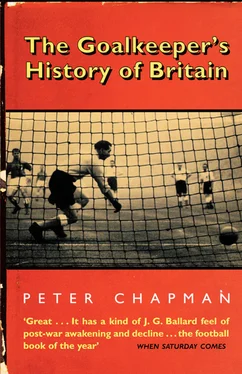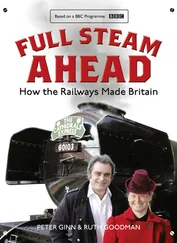1 ...7 8 9 11 12 13 ...23 Outside all was turmoil: loudspeaker announcements, with adverts and exhortations to the crowd, aeroplanes promoting everything from newspapers to cordials, and others swooping low over the pitch with cameramen on board shooting the scene. Hordes more photographers joined Swift in the middle for the toss. ‘Some standing on ladders, which they toted across the field, some lying on their stomachs,’ he said, ‘all of them arguing and gesticulating.’
England’s response to the apparent anarchy was to score almost immediately. Stan Mortensen raced to the byline and beat the Italian keeper Valerio Bacigalupo from what seemed an impossible angle. This was to the ‘astonishment and chagrin’ of the crowd, said Swift, which prompted their team to storm back. ‘For twenty minutes they threw everything at us with bewildering inter-passing and brilliant speed.’ Shots, overhead kicks, headers, the lot ‘flew at me from all directions’. Probably the most startling was from the Italian centre-forward, Gabetto. Eight yards out, he didn’t turn or take aim but back-headed the ball. A British keeper couldn’t have anticipated that kind of thing and the surprise and speed of it beat Swift. The ball hit his crossbar and bounced down just in front of the line, near enough to have the crowd screaming at the referee to give a goal. When play switched to the other end, Swift invited one of the photographers crowding behind the net to step around into the goalmouth so he could show him where the ball had landed. The fellow accepted the offer and quickly took a photo of the spot. His colleagues would have followed, said Swift, if the Italians hadn’t been straight back on the attack.
The England captain stopped everything he had to, though handed the compliments to his team. His defence was ‘rock-like’, not least Jack Howe of Derby County in his first international, ‘and incidentally the first man to play for England wearing contact lenses over his eyes’. By contrast he was sniffy about the Italian defenders, who sometimes ‘indulged in acrobatic antics while clearing the ball’. England’s forwards left the Italians dumbfounded with their simplicity of approach, namely the way they cracked the ball into the net with first-time volleys and after quick one-pass movements. But most of the honours won from England’s near incredible 4–0 victory went to Swift. It was acknowledged as his finest game in the finest England performance ever. Hitherto there was no question that Britain had the finest keepers in the world. In Turin Swift proved to be the finest yet seen.
The England selectors may even have agreed at the time. But it didn’t take them long to think again. The following season, little more than six months later, Swift was dropped. He competed for his place with Ted Ditchbum for a couple of games but, soon after, seemed to have been overcome by the affront to his pride. He stood down not only from the England line-up, but from football altogether.
The decision to drop him could have been put down to the passing years but it was not so much Swift’s age, more his style that was cracking on. The selectors were an aged crew themselves, a panel of half a dozen or so club directors or other luminaries from the football establishment. There was a picture of one of them, Arthur Drewry, in my encyclopaedia. He had the brushed-back grey hair, nervous smile and starched collar look of a Neville Chamberlain. He and his colleagues sat in learned committees, their anxiously awaited, often haphazard and mysterious decisions worthy of a puff of smoke when finally revealed. But they did what they believed was for the good of the game and chose those whom they felt were the right type.
Before the war, Swift had never been considered ready for the England team, yet he was the national character for the moment. He had acknowledged that the pressures of life were enough to get anyone down but embodied the spirit of ‘get up and get on with it’. He, as much as any popular figure, symbolised the people ‘smiling through’. Swift waved and laughed to each member of the crowd. To those going off to Africa, Sicily, Normandy, or wherever, this said, ‘It’ll be all right, son’. They didn’t know it would, but it was the best they had. With luck, and the right distance between them and the explosion when it came, they might even survive to get their medals from the king.
For my father and the other soldiers in Florence, Swift was to arrive almost at the very moment of victory. In person, not just in spirit, he was going to be on hand to begin the celebrations with them. Swift’s team won 11–0, so no one would have seen him do much goalkeeping. But you could bet when the ball was up the other end, he’d have been turning to chat with the squaddies behind his goal. My dad said it took him several years to get over the disappointment of missing that game.
Still, Frank’s elevation to the England team meant he was on hand for the party back home. As the returning soldiers ejected Churchill from Downing Street, so they went to be entertained by Swift between the posts. As a keeper able to put on a show, there was no one more perfect for the occasion. Long after Swift retired, my father and anyone who spoke about him continued to do so in terms which raised him to the status of a giant and friendly god, who made you hardly able to believe your luck that he was on your side.
By the time I heard about Swift, revision of the record had been going on for a while. My encyclopaedia made what sounded like noises of approval, yet didn’t throw its compliments around. Swift was ‘massive’ and had ‘exceptional height and reach’, features which represented no great achievement on his part. Harry Hibbs, after all, had not enjoyed such natural advantages. Swift was also ‘likeable’. There had been nothing to say whether Hibbs, Hardy and Scott had been likeable – or even whether to be likeable was a good thing. They were no doubt the soul of decency as people but their virtue as keepers was in their hardly being noticed. With Frank there was little chance of that and here lay the problem. ‘Swift might have been the greatest goalkeeper of all time,’ intoned the encyclopaedia, ‘but for a tendency to showmanship.’
He had been great for the fleeting post-war moment of celebration but deemed inappropriate for the dour times which set in. People were expected to get back to where they’d been. Women from the Naafi or the Land Army – like my mum’s sister, Olive, who’d driven a tractor, worked with the Italian prisoners in Sandy, and even had an Italian boyfriend – were wanted back in the home. Men were required in the jobs that would reconstruct the nation. Men and women were wanted back in stable relationships; Brief Encounter urged them to forget their Little flings. Everyone had to knuckle down to austerity. With a large part of the harvest being sent to Germany, there was bread rationing, something that hadn’t happened throughout the war.
Abroad it was all going haywire. India demanded and gained independence. This was serious, although in the popular mind explained by the usual muddle-mindedness of foreigners – the half-naked fakirs in loin-cloths’ that Churchill referred to. Really threatening was that the Russians had the Bomb. When Moscow Dynamo had come to tour Britain a few months after the war it was amid great public excitement. They met Rangen in Glasgow, with demand to see them so high that tickets priced at three and sixpence were touted for as much as £1 outside the ground; 90,000 people crowded into Ibrox for the 2–2 draw. But the Russians’ tour had transmitted early signals of suspicion. They said there weren’t enough flags, flowers and music to greet them. In London they wouldn’t sleep in the guards’ barracks they were given saying the beds were too hard. (How soft had the feather mattresses been during the siege of Leningrad?) They decamped to the Soviet embassy. Churchill spoke of the Iron Curtain descending from the Baltic to ‘Trieste on the Adriatic’. Churchill made his speech in the USA, among friends; his mother was American. But the USA wasn’t on our side over the empire, not least when Palestine broke up and Israel emerged. They wanted us out, for the ‘freedom’ of others, and to slip in themselves. We were being pushed back again. These weren’t Swiftian times to be bouncing around gleefully off your line.
Читать дальше












